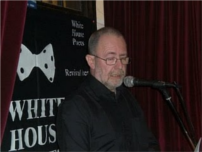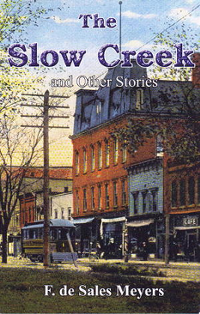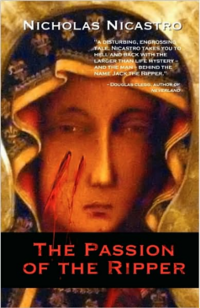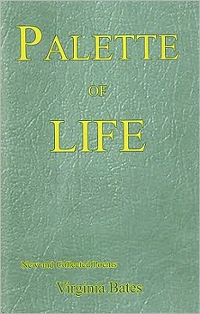Fall 2010
Table of Contents - Vol. VI, No. 3
Christopher T. George
F. de Sales Meyers,
The Slow Creek and Other Stories, Baldwin, Maryland: Abecedarian Books, 2010. ISBN: 978-0-97809822985-4-1; 183 pages, hardcover; $19.99 U.S., $24.99 Canada. Available from Abecedarian Books, 2817 Forest Glen Drive, Baldwin, MD 21013. Toll free: 1-877-782-2221; email: [email protected]; or visit http://www.abeced.com/catalog.htm
F. de Sales Meyers has written a redoubtable collection of tales about a fictional Western Maryland town that comes across as so true-to-life that the reader would swear there is such a place. The small Appalachian town in the shadow of Big Savage Mountain is peopled with diverse characters whose stories are such that once the reader has had a taste of a few of the tales they will want to read more.
The town is divided by the “slow creek” of the title story and many of the people of the town have been touched in some way by the coal mining industry that brought both prosperity and blight to Appalachia. The rocks in the stream are discolored by acid from the mines and one of the best known features of the town is the “Asthma Bench” downtown where retired miners attempt to catch their breath with lungs damaged by the coaldust and spend their last days on the bench. This makes the collection sound dour and doomy but it is anything but. All of the characters in this collection contribute to a memorable portrait of a mountain town, expertly described by Mr. F. de Sales Meyers. No surprise to learn that the author is originally from such a small town in the mountains of Allegheny County, Maryland. For many years he worked both as a freelance writer and in the information office of the Maryland Department of Mental Hygiene. What is surprising is that this is his first collection... like a diamond from the coalmine, as it were!
Readers will be moved by such stories as “Taps for Mister Reidler” told in the first person by the narrator, a young pupil of the drunken lard tub of a man named George Reidler who lives up on Scotch Hill. The man is excoriated by the folk of the town because years ago he killed a man and spent time in the Penitentiary in Baltimore. Yet he can play a trumpet so sweetly that he brings both his pupil and himself to tears. The story revolves around the death of a friend of Reidler’s, Ike Stakem, and who will be the unseen person on the hillside to play Taps for funeral of the dead man.
Many of the tales in the collection have to do with outsiders who land up in town. One of the most amusing is “Peter Mark Roget Comes to Town” about an upcoming local appearance by the famed author of Roget’s Thesaurus that Doc Harris suspects has to be a “con” because the author of the dictionary has been dead for over a century. Still he goes along with the joke because he hears that the person who arranged the author appearance is none other than Betty Martha Walton, an egotistical woman whom everyone in town thinks “has got it coming to her.”
Tragic tales are here as well and each of them will enrich the reader to just read and absorb the stories and their implications. Following are a few examples. Each of these stories has its own plot twists and surprises but these outlines will give you an idea of what is on offer. “Tomorrow” is about a simple man named Toddy Duncan who does odd jobs around town and lives in a converted chicken coop behind his parents’ former home. He is befriended by a small boy who always says to him, “Tomorrow” anticipating the slow-thinking man’s return. . . “Ethridge, the Coal Picker” tells the story of a man whose father was a miner but who himself earns his living picking coal from the slag heaps on the mountain side, a task he enjoys with the sun on his back and the calling of crows from the trees. A shopgirl named Clara in Miss Markey’s wallpaper store sets her eyes on him, and eventually finagles a way to get him to come down to the cellar of the shop and eventually get him to marry her... Then there’s a story about “The Asthma Bench”, mentioned earlier, which involves Joker Thomas, one of those old, damaged miners too ill to carry on with his occupation. He is harrassed on the bench by a drunken man named Ding Beall who accuses Joker of having killed his father with the use of his miner’s pick. How will the confrontation between the ailing Joker and the strong but drink-besodden Ding Beall be resolved? Again, the reader is captivated by the circumstances of one more story in which the characters and town come so vividly to life. This may be fiction but it is expertly wrought fiction. A highly recommended collection of tales!
Nicholas Nicastro,
The Passion of the Ripper, Seattle, Washington: CreateSpace, 2010; ISBN-13: 9781453619469; ISBN: 1453619461. Paperback, 196 pp., $11.99; Kindle e-book version, $4.99
Here’s a novel about Jack the Ripper which right away shows its literary aspirations. The first section of the novel, which pitches the reader immediately into the poor districts of London of the day where the Ripper murders occurred, is titled, “The Morlocks.” Astute readers will recognize that title as a nod to H. G. Wells’ The Time Machine---and in fact Wells himself appears as a character in this novel. Immediately below that allusive title is an appropriate quote from Shelley: “Hell is a city much like London, a populous and smoky city.” And the opening line of the novel may remind many of T. S. Eliot’s opening to “The Love Song of J. Alfred Prufrock” when Mr. Nicastro opens with: “The guts of London are laid out as if on a surgeon’s table.”
From there on in, the novel is all Nick Nicastro as the London of 1888 is well evoked by the novelist, the author of five previous historical novels on various topics. The writer tells us that his aim in writing The Passion of the Ripper was to create “a different kind of Ripper story: not a whodunit, but a naturalistic exploration of the man, his city, and his times. It tells this well-known story from the inside out, from the points of view of the killer, the cops, and his final victim. It is the result of extensive research on the subject, but the aim is a kind of truth beneath and beyond the facts.”
It is not too forthcoming to reveal that the Ripper of the story is identified pretty early on in the novel when the scene shifts from London to Poland and we get a glimpse of the early life of an assistant surgeon named Severin Klosowski, who would later emigrate to London to work as a barber (being unable to qualify for licensure as a medical man), taking the name George Chapman. While in his native Poland, the suspect is portrayed as a man with strange sexual proclivities in the presence of an icon of the Black Madonna of Czestochowska—whose bloody-cheeked image is featured on the cover of Nicastro’s novel.
George Chapman is not a mainstream candidate for the unknown murderer of 1888 that we know today as Jack the Ripper. The infamous serial killer either gave himself the name or else possibly he received it—for better or worst and for all time—from an enterprising London journalist desiring to “hype” up the stories by writing the “Ripper letters” written to the authorities in which the writer claimed to be the bloody murderer.
Chapman was ultimately arrested for the poisoning murder of several common-law wives and was hanged in 1903. Although the main detective on the 1888 case, Scotland Yard’s famed Chief Inspector George Frederick George Abberline, by 1903 retired, supposedly said to his former subordinate, Inspector George Godley, “You’ve got Jack the Ripper at last!”, most experts on the Ripper case point out the large gulf in nature between the types of crimes attributed to Chapman and those of the Ripper: Chapman’s disposal of his “wives” secretive and duplicitous and the Ripper crimes bloody murders and mutilations done on the public streets of the East End of London; the Chapman crimes done to women the murderer knew and lived with, and the Ripper crimes done to street prostitutes that the killer probably did not know beforehand.
Nick Nicastro expertly captures the passion of the moment of the murders and the psychology of the man who committed them. Whether the barber Polish barber was Jack the Ripper or not, the novel makes for an enthralling and informative read. The book is available through Barnes & Noble and Amazon.
Frank Prem,
Memoir of a Dog with illustrations by Leanne Murphy, Beechworth, Victoria, Australia: Prem-Murphy Productions, 2008. ISBN: 9780975144213, paperback, 53 pp. Available from Prem-Murphy Productions, 23 John Street, Beechworth, Victoria 3747, Australia. Memoir of a Dog retails for $A20.00 + p&h and is available from www.noodlybark.com.au.
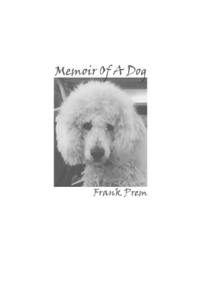
Frank Prem’s on-line persona is “Frank Faust” which might give you a hint at the tongue-in-cheek and witty nature of much of his poetry. Frank explains: “The choice of by-line came about a few years ago when I first gave in to writing seriously, as a vocation, and decided to seek an audience willing to read and critique my scribblings. I made a deal with the devil to write my soul in return for the reward of being read.”
Whether Frank bartered his soul in writing Memoir of a Dog remains to be seen. The title of the large format (9 ¾ inch by 7 inch) chapbook is a little bit misleading—it might imply that it is written from the perspective of a dog. Rather, it is a poignant cycle of poems written by a dog owner. Prem has written an appealing series of 23 poems about the life and death of a standard poodle named Sparky. The poet’s partner, Leanne Murphy, has provided attractive sketches to go with Prem’s sensitive and entertaining poetry.
As related in a poem near the beginning of the book, the poet, his wife and two sons set out to get a small dog. The following poem is typical of Prem’s relaxed and personal style:
we had the debate
agreed
it was time
the kids were demanding
it would be good for them
they needed something
couldn’t be a cat though
too much allergy in the air
so
something that wouldn’t shed
that could live inside
let’s not fool ourselves
it will definitely be inside
okay
one that has wool
needs to be something small
a toy
or a miniature
something the boys
can look after
that is not a plaything
and they’re old enough
to have some responsibilities
is that understood kids
yes
yes
right
next
the magazines
to select what kind
good lord
there’s so many
to pick from
how will we ever decide
The family visits a breeder of standard poodles. The man informs them (in the last part of “naming the purchase” which extends over four pages):
american stock
not white but cream
he’ll have apricot coloured hairs
in amongst the wool
when he grows
that’s unique over here
I can sell you clippers
and tell you how to groom him
you don’t have to give him a lion cut
just let him be a woolly dog
if you prefer
would you like him
~
a little white fluff-ball
in a box
we can’t believe
what we’ve done
these are big dogs
we wanted small
he’ll need more looking after
than we’d planned to do
oh well
satellite comet power
what a name for a woofer
we can’t have that
comet
pow-wow
‘lectric
no
none of those
Pluto
uranus (ho ho adult joke)
.
.
.
.
what about ‘sparky’
.
.
.
.
sparky
yes that’ll do
for mr satellite comet power
sparky
will do
Later, the family disintegrates under the demands of job pressures, one son becomes ill and the other becomes alienated from mother and father, and the dog feels the tension. The following are the final stanzas of “a definition of us”—although the piece is perhaps a bit too prosey as the poet outlines the family difficulties, the poem achieves heartbreaking poetry in its final lines:
when there are four conversations
happening at once
and no-one listening
except the dog
ever hopeful someone will break the rules
to feed him a tid-bit
beneath the table
in these days we are each comforted
by the constancy and loyalty
the intelligence in his eyes and the open smile
that’s always there for us on the big poodle’s face
sometimes he seems the only thing
we all have in common
that we all love without restraint
the part of our family
that binds us together
hard to imagine
how we would cope
if he weren’t with us
hard to imagine
us
As the book winds down, the poignant quality of the verse increases. One day, Sparky is savaged by a malamout (the word was new to me—is it some weird and fierce Aussie marsupial?---why, no, it’s a large Alaskan husky; you can tell I am not a dog person!). Sparky thankfully makes an almost complete recovery, only to succumb later to a cardiac disorder, as related in this passage from “things it’s not possible to know”:
it’s called a sac
the pericardial sac
the vet said it was filling up
with blood
the poor bastard’s heart
was choking itself to death
nothing to be done to save him
no clear cause
sometimes these things just happen. . .
Memoir of a Dog is a loving tribute to a family pet by an accomplished Australian poet. Frank, accept both the condolences and congratulations of Loch Raven Review---Sparky lives on through your verse.
Virginia Bates,
Palette of Life: New and Collected Poems, Baldwin, Maryland: Abecedarian Books, 2010. ISBN-13: 9780982298534; ISBN: 0982298536; 277 pages, hardcover; $19.99 U.S., $24.99 Canada. Available from Abecedarian Books, 2817 Forest Glen Drive, Baldwin, MD 21013. Toll free: 1-877-782-2221; email: [email protected]; or visit http://www.abeced.com/catalog.htm
Virginia Bates’ Palette of Life represents a feast of poetry by an accomplished Maryland poet. This is the veteran poet’s life work, and it is well worth a read. No white space here—the collection is packed full of the poet’s entertaining and informed musings on everything around her. And she is not afraid to tackle some difficult and prickly issues with wit and intelligence:
Now I lay me down to sleep
The outer space craft and sub-atomic vessels
My soul to keep;
If I should die before I wake
Please no C.B. warfare my soul to quake.
Keep the sun and the planets on their way
And let me play another day.
Vestal Virgin
Dedicated to the eternal flame
Chained impassioned to purity
The spinster flicks the ashes from her cigarette
And without a moment’s pause
Prepares to light another.
Our Via Dolorosa
Are we constructing our via dolorosa on the way
To our nuclear and biological crucifixion?
Will we have flags and flowers?
Will we sing in our last hours?
Or will our throats choke with grief and fears
As we release all pent up tears?
The poet can be unapologetically sentimental and realistic at the same time, as in this one about her late husband:
Confident Aquarian fellow
You seized my Pisces heart.
Two different but deep down harmonious souls
Making peace and justice music
Almost half a century.
Oh, yes!
There were discords
But the final opus
Created an unforgettable symphony of love.
Older readers might well appreciate how in a number of her works the poet evokes the stars of the silver screen from Hollywood’s heyday—as well as, here, recalls a landmark Baltimore movie house:
Movie House on North Ave in Baltimore.
Magic refuge
Spawning dreams
Each Saturday afternoon---after kitchen chores
My dime salary bought Paradise.
Walking ten blocks, sneaking an apple on the stick or a bit o’
Honey in the dark
To rendezvous with cowboys, matinee idols,
Villains and clowns
Dancers and prancers
Singers and swingers
Gable and Harlow
Lucy and Red
Ginger and Fred
Norma, Sophia, Hepburn, and Cary
Ingrid, Jeanette, Bette and Gary.
All made Saturday my special day.
Yes, the Walbrook holds memories from days of yore.
It showed me romance and life and war.
Dear Walbrook in my life you played a large part.
I’ll cherish you always in my heart.
While Virginia Bates’ verse will never challenge that of Sylvia Plath or Emily Dickinson for its erudition, still her homespun and attractive verse has its place. A recommended read.
Grant D. McLeman,
Street Magic, Worthington, Massachusetts: Spiritus Mundi Press, 2009; paperbound chapbook; 46 pages. Contact: [email protected]
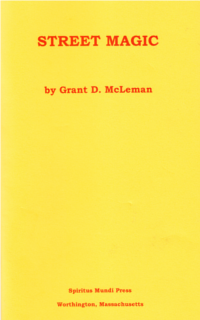
Grant D. McLeman lives on Clydeside in the Glasgow area of Scotland but prefers not to be thought of as a “Scottish poet.” Rather, he has sought through the Internet to make an international poetry connection through the Poetry Kit e-mail list run by Merseyside performance poet Jim Bennett, through appearances at the White House Poetry Revival in Limerick City, Ireland, and planned collaborations with poets who write in Arabic, Farsi, and Spanish.
Street Magic is McLeman’s first chapbook, and a welcome collection of the poet’s views on modern life it proves.
Interestingly, given the poet’s wish to connect with other poets internationally a number of his poems are about travel, on the earth and beyond:
this moon, this mad symbol
of everything that is right
and everything that
is wrong
with us and our adventure,
has pulled us toward it
and we have travelled there
and back again
even though there are
no guaranteed return tickets
and certainly no way back
to the everyday days.
No more speaking to the girl
next door like
she is just the girl next door,
our friendship is now so close
I can feel its hot breath
on my neck.
And would I have it any other way?
No, I would rather travel
to the moon and back again
a million times with you
than to have never known you or
merely shaken hands with the day
that I saw you.
Return Trip
I watch you come down
from the train,
adjust your fact from dreaming
and negotiate the platform with
your overnight bag.
You are wearing the silk scarf
and a half remembered energy
jolts my heart.
My mind takes a taxi
to the time when the station
was a place of arrival,
a journey’s end, a friend.
You reach the barrier
and we embrace like strangers.
I curse Return tickets and
the inevitability of railway lines.
I know we can’t go back
and this will soon be a place of
departure.
“Return Trip” is a poem infused with regret, extremely well handled by this “non-Scottish” poet. Mr. McLeman likewise also displays a fine sense of wit in this shortie which plays upon a kind of malapropism that sounds as if it could be an exotic name:
Long Veh has his own way out
a separate route to the same place
or so it seems
I wondered why this Asian man
has been singled out for special treatment.
Perhaps he is an important visitor
to our shores,
an ambassador of goodwill,
until I realized, emerging from my motorway fog,
that he is (or rather they are)
just big lorries.
Margaret S. Mullins, Editor,
Manorborn: The Water Issue, Baldwin, Maryland: Abecedarian Books, 2009. ISBN-13: 9780982298527; ISBN: 0982298528; 184 pages, paperback; $14.99 U.S. Canada. Available from Abecedarian Books, 2817 Forest Glen Drive, Baldwin, MD 21013. Toll free: 1-877-782-2221; email: [email protected]; or from the Harford Poetry and Literary Society, email: [email protected]

A bit late with this review but Loch Raven Review readers should know about this fine anthology from the Harford Poetry and Literary Society. Manorborn: The Water Issue contains writing and photography on the theme of water by such accomplished writers as Rafael Alvarez, Vonnie Crist, Daniela Gioseffi, Clarinda Harriss, Niels Hav, Ellaraine Lockie, Katharyn Howd Machan, Gregg Mosson, Doug Ramspeck, Tad Richards, Michael Salcman, Elizabeth Spires, Afaa Michael Weaver, Colleen Webster, Warren Woessner, MiMi Zannino, and others. Many of these writers have featured in Loch Raven Review and the wealth of talent shows.
Here are some examples of the fare on offer:
It hadn’t been three months since he had died
when we sat together in your living room,
a green world going on outside, the June wind
blowing hot and hard, bending each leaf and branch,
while inside all was still: a still interior where
three women sat in shadow stirring summer drinks,
the room the same as it had always been,
but changed, his absence palpable. You said,
“I thought I’d gradually miss him less, the way
a craving for a cigarette lessens a little after weeks
of going without. It’s not like that.” You paused,
drawing in a breath. “It’s like a thirst that deepens
as each day passes. Like water,” you finally said.
“I want him back the way I want a drink of water.”
Elizabeth Spires
October Rain
Toads squat, calm on palms,
as a gray pointillist’s mist
enshrouds their chilled ponds.
Daylong, their cocked arms
spar the drizzle, like docked skiffs.
All clears soon enough.
Gregg Mosson
Manorborn: The Water Issue contains a treasury of such excellent pieces. I must confess that my personal favorite in the volume might be the witty essay by Baltimore activist and political satirist Alan Barysh who puts aside his usual political objectives to give us “Streams of Consciousness.” I’ve read the piece a number of times and it always makes me chuckle. Splish-splash.
© Christopher T. George


